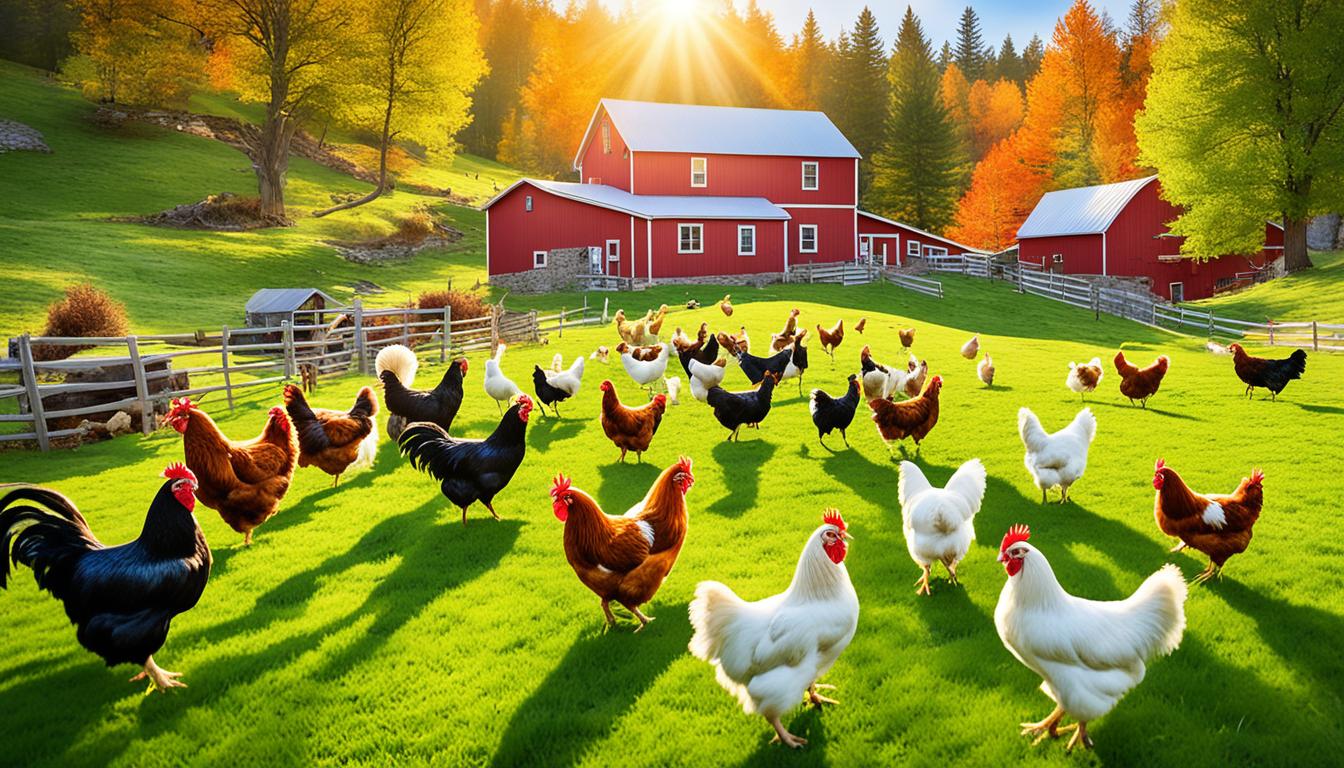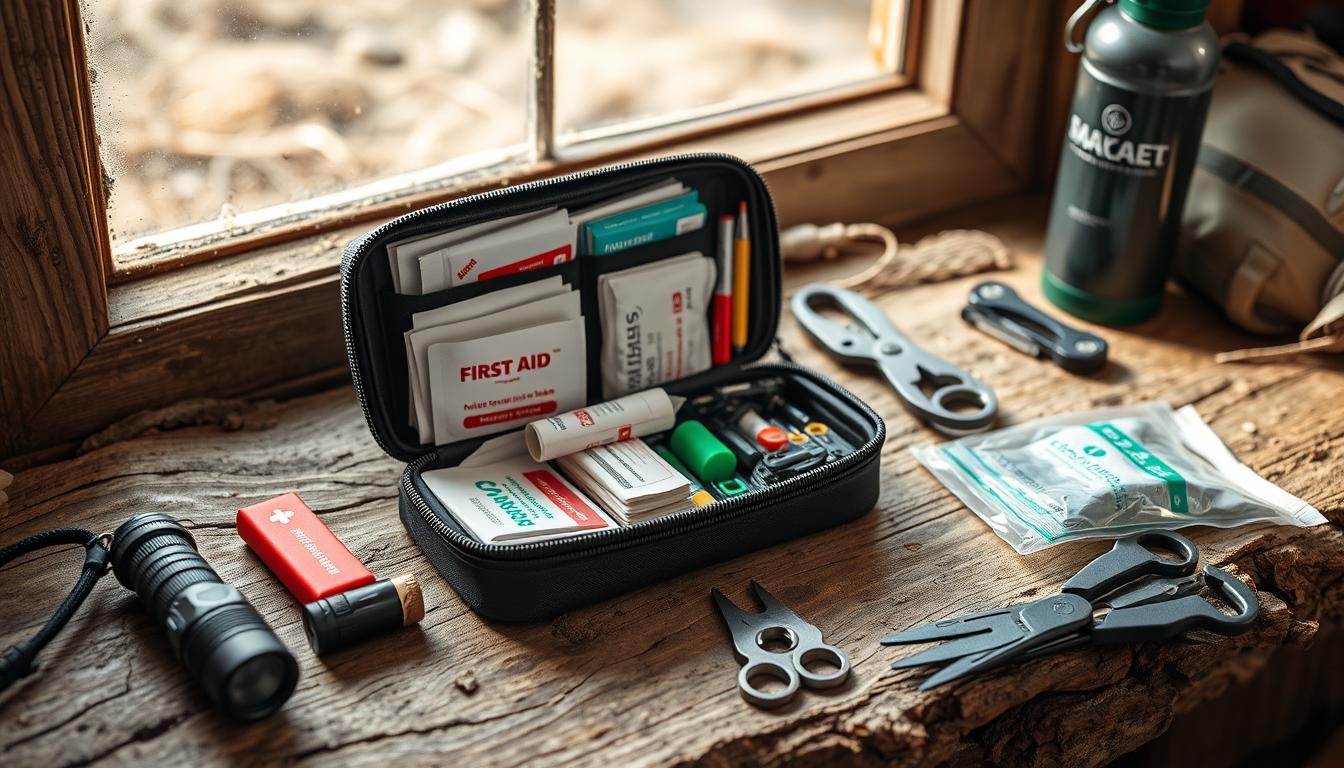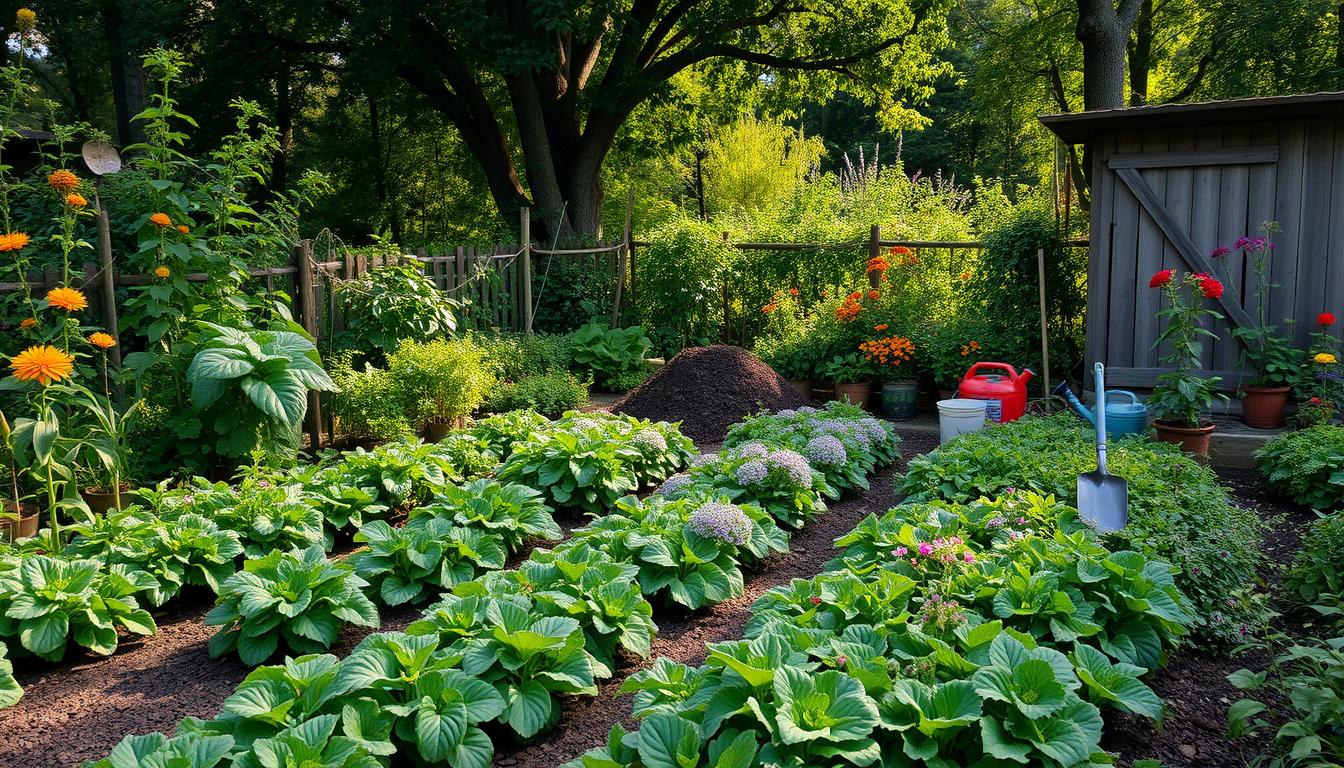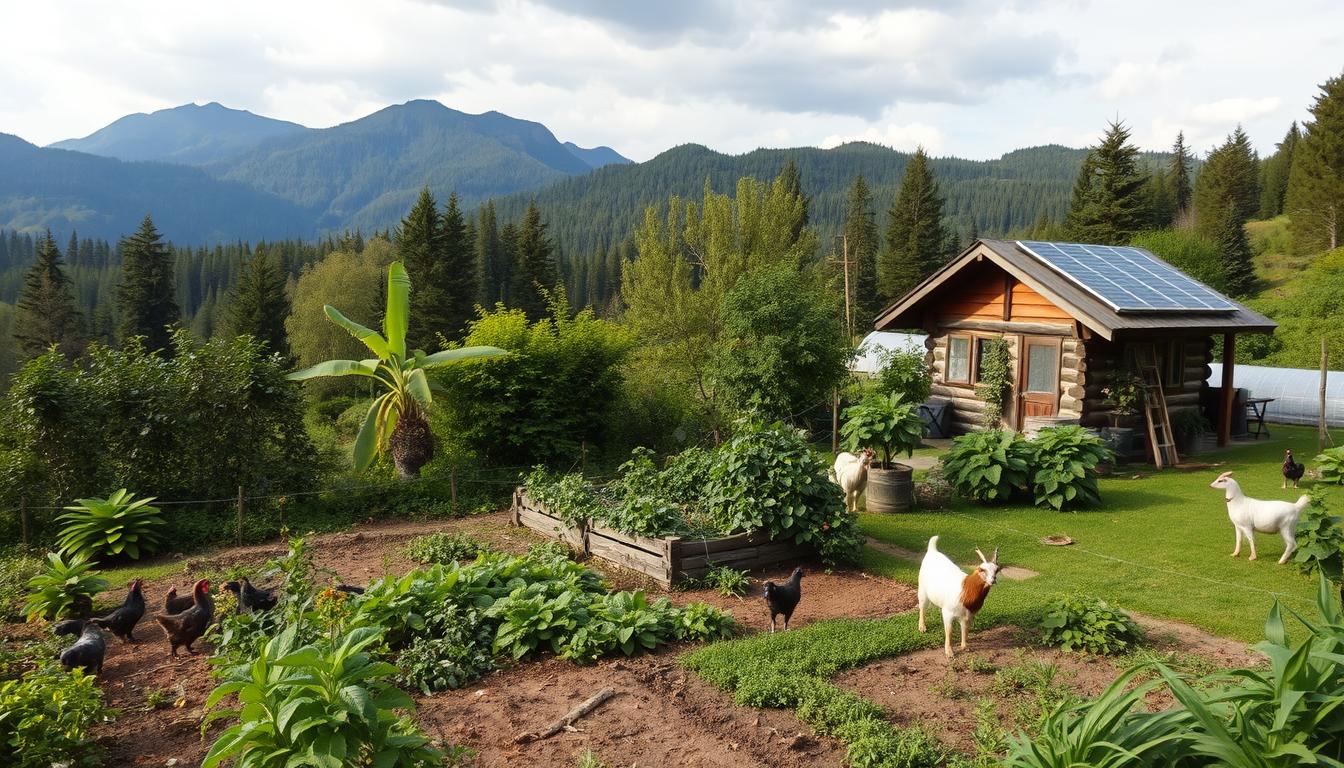Homesteaders, preppers, and survivalists often look to animal husbandry for self-reliance and food security. This guide covers the key principles of raising livestock. It focuses on the rewarding parts of keeping chickens, goats, and other animals on your land.
If you’re new or experienced in homesteading, you’ll find helpful tips and advice. Learn about choosing the right breeds, setting up their homes, feeding them, and adding them to your sustainable farm. See how self-reliant animal husbandry can boost your homestead or small farm’s self-sufficiency.
Key Takeaways
- Explore the fundamentals of animal husbandry for homesteaders and preppers
- Learn how to select the right chicken and goat breeds for your needs
- Understand the essentials of housing, feeding, and caring for your livestock
- Discover the advantages of incorporating chickens, goats, and other animals into your homestead
- Gain the knowledge and confidence to become a self-reliant animal caretaker
Introduction to Animal Husbandry
Animal husbandry is key to modern farming. It covers the care, breeding, and management of domestic animals. For preppers or those into preparedness, knowing about animal husbandry is crucial. It offers a steady food supply, fiber, and can even bring in money. Let’s look into animal husbandry and see why it’s so important.
What is Animal Husbandry?
Animal husbandry deals with the science of managing and growing domestic animals like cows, sheep, pigs, and poultry. It uses various practices and techniques. These help animals stay healthy, productive, and happy. This way, they can help us by providing food and income.
Benefits of Raising Livestock
For preppers and those into preparedness, raising livestock has many benefits. Some main advantages are:
- Increased food security: It makes sure you have a steady supply of meat, eggs, and dairy. This cuts down on buying from stores.
- Reduced costs: It can save money compared to buying these products all the time. This is especially true during uncertain times or when supply chains break down.
- Potential income streams: You can sell or trade any extra animals and their products. This adds to your income or helps you get other important items.
- Self-sufficiency: Being involved in animal husbandry makes you more independent. It fits well with the idea of being prepared.
“Raising livestock is not just about securing a food source; it’s about building a more resilient and self-sufficient lifestyle.”
Starting with animal husbandry opens up many chances to improve your preparedness. It helps you become more self-sufficient.
Getting Started with Backyard Chickens
If you’re a homesteader or survivalist, raising backyard chickens is a great idea. Chickens are easy to care for and give you fresh eggs. They also help with pest control and composting. This guide will help you start with backyard chickens, from picking the right breeds to setting up a coop and run.
Choosing the right breeds is the first step. Popular breeds for beginners include Rhode Island Reds, Orpingtons, and Australorps. These are friendly and lay lots of eggs. Think about what you need, like eggs or meat, when picking breeds.
After picking your breeds, set up a cozy coop and run. The coop needs space, good air flow, and protection from predators. The run lets your chickens move around, dig, and find food. Make sure it has nesting boxes, roosting bars, and a dust bath area for their health and happiness.
Looking after your backyard chickens is rewarding. It gives you fresh eggs and garden fertilizer. With some planning and care, you’ll enjoy a thriving homestead or survivalist life with your chickens.
Choosing the Right Chicken Breed
Choosing the right chicken breed is key for homesteaders. It affects the success of your poultry. Chickens fall into two main groups: egg layers and meat birds. Each has its own needs and traits.
Egg Layers vs. Meat Birds
Egg-laying chickens are great for homesteaders who want lots of fresh eggs. They are reliable. Rhode Island Reds, Orpingtons, and Australorps are top egg layers.
Meat birds grow fast and give a lot of meat. Cornish and Wyandottes are best for those focusing on meat.
Popular Chicken Breeds for Beginners
For beginners, picking the right chicken breed matters. Look for breeds that are easy to care for and adaptable. Here are some top picks:
- Rhode Island Reds: Great for both eggs and meat.
- Orpingtons: Friendly, lays lots of eggs, and has a lot of meat.
- Australorps: Produces many eggs, is easy-going, and fits many climates.
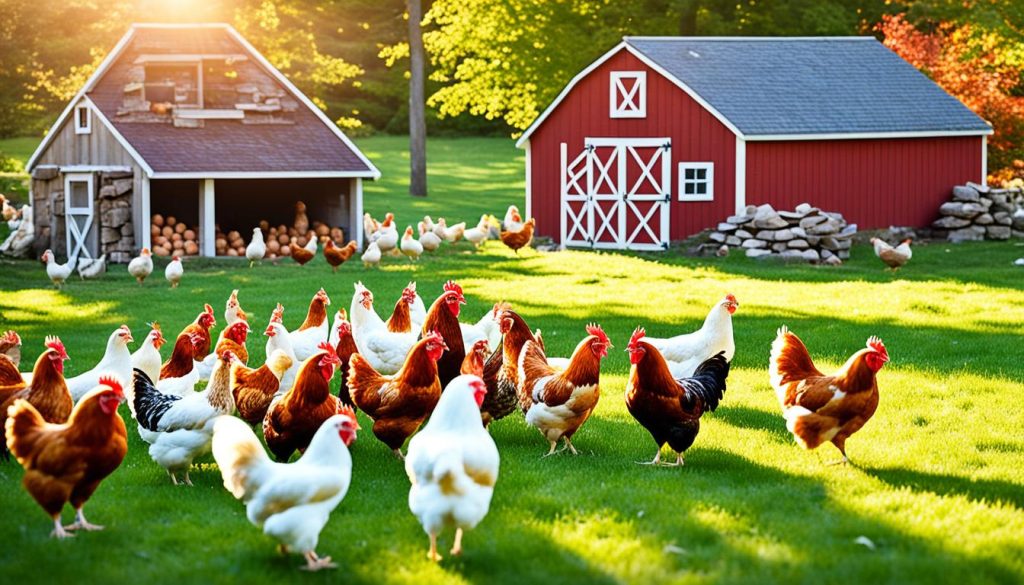
Your choice of chicken breed depends on your homesteading goals and likes. Knowing the differences between egg layers and meat birds helps. It also helps to know about beginner-friendly breeds. This way, you can make a smart choice for your homesteading.
Housing and Coop Setup for Chickens
As a homesteader or prepper, it’s key to give your chickens a comfy and safe place. A well-thought-out chicken coop is vital for their health and your peace of mind. You need to think about several important factors to make sure your flock does well.
Coop Design Considerations
When designing your chicken coop, consider the size, ventilation, and how to keep predators out. Your coop should give your chickens enough room to move, with at least 4 square feet per bird. Good ventilation keeps the air fresh and the temperature right. Also, a strong coop and secure fencing will keep predators away.
Nesting Boxes and Roosting Bars
Nesting boxes and roosting bars are key parts of a good chicken coop. Nesting boxes let your hens lay eggs safely and comfortably. Roosting bars give them places to sleep high off the ground. Make sure these parts are the right size and in good spots to help your chickens behave naturally and lay healthy eggs.
“A well-planned and constructed chicken coop can make all the difference in the health and happiness of your flock.”
By thinking about the design, air flow, and important features of your chicken coop, you’ll make a safe and caring home for your homestead or prepper life. With the right setup, your chickens will be happy and give you fresh eggs and meat.
Feeding and Caring for Chickens
For homesteaders and survivalists, taking care of your backyard chickens is key. It’s important for their health and how well they produce. Let’s look at what they need to eat and how to keep them happy and healthy.
Chicken Nutrition: Balanced Diets and Supplements
Chickens need a balanced diet to stay healthy and keep laying eggs. Their food should have grains, proteins, and vitamins and minerals. Homesteaders and survivalists can add things like crushed eggshells or oyster shells for strong eggshells.
- Provide a high-quality, complete chicken feed
- Offer a constant supply of clean, fresh water
- Consider adding calcium-rich supplements for eggshell health
Essential Care Routines
Keeping their coop clean, controlling parasites, and watching their health are key. Doing these things helps your homesteader or survivalist chickens stay well.
- Clean the coop regularly to maintain a healthy environment
- Implement effective parasite control measures
- Closely monitor your chickens’ health and address any issues promptly
“Proper feeding and care are the cornerstones of a successful backyard chicken operation. By following these guidelines, you’ll be well on your way to keeping your flock happy, healthy, and productive.”
A well-fed and cared-for flock gives you eggs and meat. This makes them a great asset for any homesteader or survivalist.
Goat Keeping for Beginners
Raising goats is great for homesteaders and preppers. They offer milk, meat, and fiber. This section will cover the differences between dairy and meat goats. We’ll also look at popular breeds for beginners.
Dairy vs. Meat Goats
Dairy goats like Nubian and Alpine produce a lot of milk. Meat goats, such as Boer and Kiko, are raised for their lean meat. Think about what you need and what your homestead can offer when choosing.
Popular Goat Breeds for Beginners
- Nubian Goats are friendly and produce high-quality milk.
- Pygmy Goats are small, tough, and great pets. They also give a bit of milk and meat.
- Nigerian Dwarf Goats are compact and easy to handle. They’re known for tasty milk.
Choosing the right breed means considering their needs. Proper housing, fencing, and food are key for your goats’ health. Knowing the differences between dairy and meat goats helps you pick the right ones for your goals.
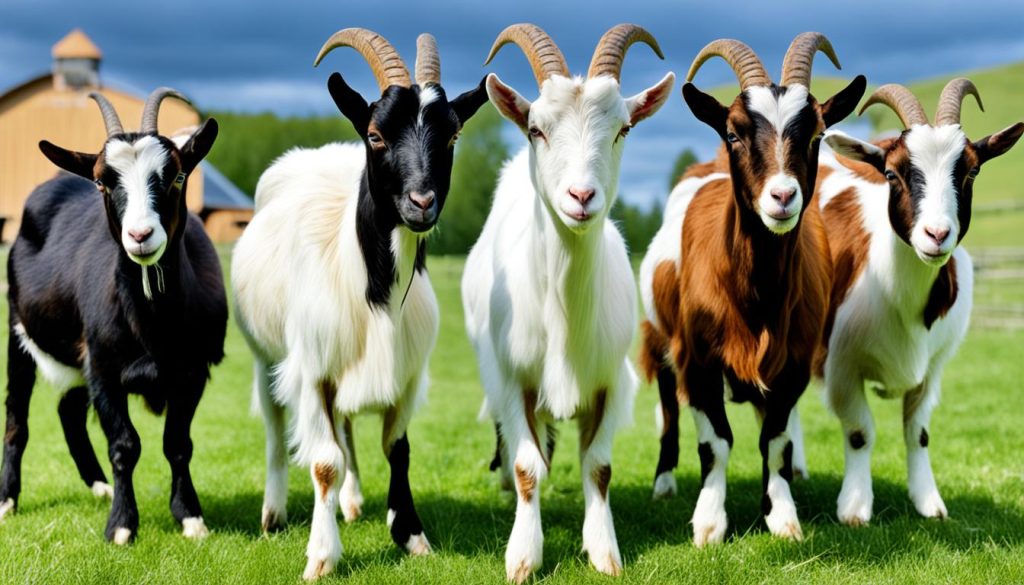
“Raising goats can be a rewarding and practical addition to any homestead or small farm.”
Animal Husbandry Basics
For those who are prepared or into survivalism, knowing how to care for animals is key. This includes chickens, goats, and other farm animals. It’s crucial for crisis situations or living a more independent life.
Keeping animals healthy is a main part of animal husbandry. This means keeping up with vaccinations, controlling parasites, and watching for diseases. By doing these things, you help your animals stay healthy and productive.
- Proper housing and shelter
- Nutritious feeding and pasture management
- Responsible breeding and reproduction practices
- Effective biosecurity measures to prevent the introduction and spread of diseases
It’s also important to know about the different animals you might have. Whether it’s chickens for eggs, goats for milk, or other animals, you need to meet their specific needs. This makes your farm or homestead more successful and sustainable.
“Preparedness is not about being afraid, it’s about being ready.”
Learning about animal care helps you take better care of your animals. It also makes you more ready for anything unexpected. This knowledge is key to being a good caretaker of your land or home.
Shelter and Fencing for Goats
It’s key to give your goats a good shelter and secure fencing. This is true whether you’re a homesteader or a prepper. Knowing what to look for in goat housing and fencing is vital for their health and safety.
Goat Housing Requirements
Goats need shelter from rain, wind, and extreme temperatures. A simple, well-ventilated structure with outdoor access is perfect for them. It should have enough room for them to move and have clean water and food nearby.
Fencing Options for Goats
Choosing the right fencing is crucial to keep your goats safe and in place. For homesteaders and preppers, here are some top fencing choices:
- Electric fencing: Stops goats and other animals from leaving.
- Woven wire fencing: Strong and can handle a goat’s curiosity.
- Portable fencing: Easy to move, great for temporary areas or rotating grazing.
Make sure the fence is tall (at least 4 feet) and deep underground to stop goats from escaping or digging under.
“Proper shelter and secure fencing are the foundation of a successful goat-keeping operation, whether you’re a seasoned homesteader or a prepper building your self-reliant lifestyle.”
Goat Feed and Nutrition
Keeping your homesteader or survivalist goats well-fed is key to their health and productivity. Goats need a special diet to stay healthy and happy. It’s important to manage their diet carefully to make sure they do well on your farm or homestead.
Forage and Hay
Goats love to eat shrubs, bushes, and weeds. They need a lot of good forage to stay healthy. Adding quality hay like timothy or orchard grass to their diet helps them get enough fiber.
Balanced Supplementation
Goats might also need supplements to get all the nutrients they need. This could be grains, minerals, and vitamins, depending on whether they are dairy or meat goats. Talking to a vet or livestock expert can help you figure out what supplements your goats need.
Grazing Management
- Rotate grazing areas to prevent overgrazing and maintain a healthy, diverse pasture.
- Ensure access to clean, fresh water at all times.
- Monitor your goats’ body condition and adjust their feed as needed to maintain optimal health.
“Proper nutrition is the foundation of a healthy, productive goat herd. By understanding and meeting their dietary needs, homesteaders and survivalists can ensure their goats thrive on the farm.”
By following these best practices for feeding and nutrition, you can help your goats stay healthy and productive. This is great for homesteaders and survivalists looking to be more self-sufficient.
Raising Other Livestock
Chickens and goats are popular choices for homesteaders and small-scale farmers. But there are other animals you might consider. We’ll look at rabbits, sheep, and pigs. We’ll cover their housing, feeding, and care needs. This info can help you grow your farm or homestead.
Rabbits: Versatile and Rewarding
Rabbits are great for homesteaders and preppers. They are easy to care for and need little space. They give meat, fur, and fertilizer. When picking a rabbit breed, think about size, personality, and what you want them for (meat, fur, or pets).
Sheep: Woolly Wonders of the Homestead
Sheep are a good choice for homesteads. They give wool, meat, and milk. For beginners, try Dorper, Katahdin, or Shetland sheep. These breeds are tough and easy to adapt.
Pigs: Efficient Foragers and Meat Producers
Pigs are often not considered, but they’re great for homesteaders and preppers. They help with land management and give a steady pork supply. Look at Berkshire, Tamworth, or Duroc pigs for their good meat and toughness.
Adding these animals to your farm or homestead makes your production more diverse. It boosts your self-sufficiency and offers new learning chances. Always research the needs of each animal to keep them healthy and happy.
“Diversifying your livestock not only increases your self-reliance but also introduces new and fascinating elements to your homesteading journey.”
Integrating Livestock into Your Homestead
Adding livestock to your homestead is a rewarding journey for homesteaders and survivalists. It’s about planning well and making the most of your animals, plants, and environment. This approach creates a system that uses resources wisely and boosts your readiness.
Using the waste from your animals can make your garden and farm better. For example, chicken, goat, or rabbit manure can be turned into fertilizer. This not only cuts down on waste but also makes your soil richer. This leads to healthier plants and more food.
Think about how your animals can help your homestead in different ways. Goats can give you milk, cheese, and meat, and they can also clear weeds and brush. By picking the right animals, you can make a system that works well together. This system uses fewer outside resources and makes you more ready and independent.

